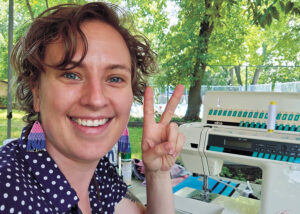One of the terms I heard repeatedly at Gathering 2019 from June 29 to July 1 in Abbotsford, B.C. was “institutional church.”
As in, “The institutional church would do things that way, but I’m different.”
Or, “The institutional church is dying, but thankfully my friends and I have our own thing going.”
Or, “Don’t blame me, I’m only on the fringe of the institutional church.”
What was curious was that this dismissal of the “institutional church” was happening at a gathering organized and funded by the “institutional church.”
The justice work many of us celebrated was initiated by the “institutional church.” The place where we advocate for change was in the “institutional church.” The schools that educated many of the conference participants were sponsored by the “institutional church.” The collection of music from which we sang was created by the “institutional church.” The digital projector showing the pictures of the “non-institutional” initiatives was rented by the . . . wait for it . . . “institutional church.”
And this is fine—really. If it’s helpful to distance oneself from the church for the sake of some greater good, I feel no need to get worked up. It’s certainly true that many institutions, the church included, have caused problems. Institutions have power, which is why we both love and loath them.
What I do think is important, however, is that we acknowledge our debts. I’m not thinking so much about finances, though the fact that we usually do is an interesting commentary on our times.
The truth is that we all carry more profound debts than car loans and credit cards. This first struck me some years ago when I met the unassuming woman who taught me to read (she now helps imprisoned folks study for their GED). I could not, as a child, have taught myself to read. I did not pay her to teach me. I did nothing at all to earn this skill that has been so foundational to my life.
I’ve recently read Timothy J. Gorringe’s book The World Made Otherwise: Sustaining Humanity in a Threatened World. Gorringe taught theology for a time at the University of Exeter. He’s an Anglican Priest and, less painfully, a beekeeper.
Gorringe’s book is a bit of a slog, but one of the points he makes in a few different ways is that we all carry social, intellectual and, yes, ecological debts. The purportedly self-sufficient, multi-national company profits from civil infrastructure. The very companies that try to avoid paying taxes use our bridges, roads, laws, postal system, health care and so on. ‘Self-made’ women and men succeed because of schools and mentors that they did not create. All of us can do what we do because massive and intricate ecological systems give us air, water, energy and so much more. And, yes, many of us have been positively shaped by institutions like the “church,” even if it takes a bit of reflection to see how this is so.
We are all indebted. The Christian word for this, if you would like a description more positive, is “grace.” We are all suspended in grace. We are all suspended in grace, and there should be no shame in admitting it.
Anthony G. Siegrist pastors at Ottawa Mennonite Church in Ottawa, Ont. and is the author of the forthcoming Herald Press book, Speaking of God: An Essential Guide to Christian Thought. He blogs at anthonysiegrist.com, where this post originally appeared.







